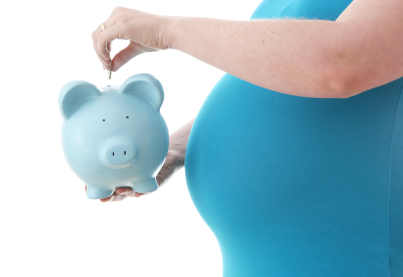Having a baby is a joyous occasion, but it can place a financial strain on a household budget. Without financial planning, new parents adjusting to caring for an infant may find themselves enduring significant stress due to the additional expenses incurred. One of the most important steps expectant parents can take, in between stocking up on diapers, is developing a reasonable baby budget that considers new costs associated with the family addition.
Following are six new costs expectant parents need to budget to ensure they are as financially prepared as possible for the happy event:
1. Health insurance copays are often overlooked. Even good insurance that pays most of the hospital bill can lead to parents paying thousands of dollars for the portion of the bill the insurance does not cover. A survey conducted by the magazine “Redbook” and VISA found that 25 percent of new parents had to cover over $2,000 in out-of-pocket hospital expenses. There will also be additional healthcare expenses for doctor checkups for mother and baby.
2. Another overlooked expense is the amount of income lost if a working new parent must take unpaid leave to care for the newborn. It is important to plan ahead and ensure there is enough money to cover routine monthly expenses.
3. Naturally, there are many specialized equipment items a baby needs, including a car seat or car carrier, crib, high chair and stroller. These items can add up and should be purchased in the months leading up to the birth. However, as the infant rapidly grows, it may be necessary to purchase items that accommodate a larger size baby. For example, newborn car seats are designed to accommodate infants up to approximately 10-15 pounds, at which point a new seat is needed that is able to hold a larger child.
4. Keep in mind that adding a new person to a household, no matter how small that person may be, will increase utility and food expenses. It is important to budget for the ongoing expenses that include diapers, formula, lotions, baby wipes and many other items.
5. Expecting parents normally get many infant care items at baby showers and as gifts from friends and family trying to help out. A good plan is to inventory the gifts and determine what is still needed. Are there enough bibs, blankets, comforters, crib sheets and so on? If not, the expecting parents will need to budget for the additional purchases.
6. It is wise to add some money in the budget for unanticipated expenses. What financial sources are available should the infant have special medical needs? What would happen if the new mother could not return to work as quickly as planned? Is there money set aside for the first few months of daycare? Approximately a $1,000 per month is needed for daycare, depending on the location.
“Redbook” research indicates that a child under one-year old will add approximately $9,840 in annual expense to a household with income between $41,700 and $70,200. Expecting parents that spend time making sure their financial house is in order can spend more time after the baby is born just enjoying the experience. For couples that have decided the time is right to visit the California Cryobank, the six expense categories listed can serve as a financial guide for early planning.
Earnest Parenting: help for parents who are planning a family addition.


